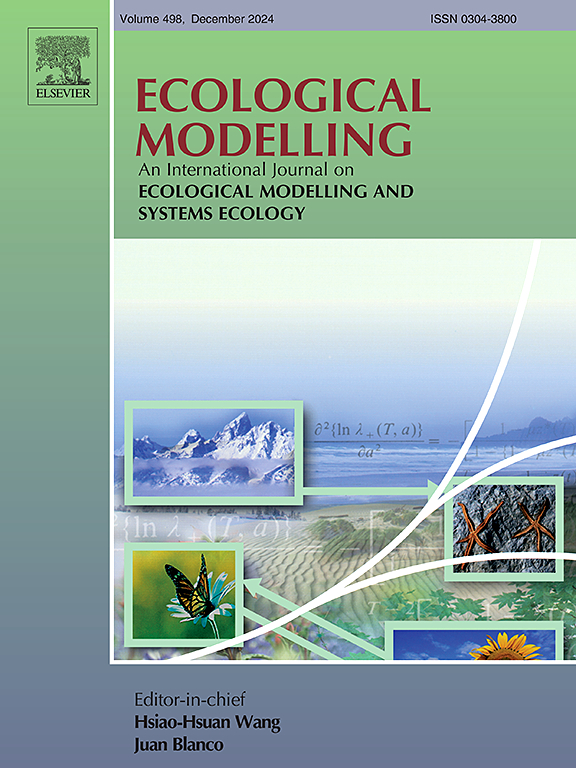运用系统动力学模型实现基于社会生态系统的渔业管理:来自鳗鱼渔业的经验教训
IF 3.2
3区 环境科学与生态学
Q2 ECOLOGY
引用次数: 0
摘要
热带鳗鱼渔业的可持续性日益受到过度捕捞和环境退化的威胁。解决其社会生态系统(SES)固有的复杂性、不确定性和异质性对有效管理至关重要。本研究提出了一个参与式系统动力学(SD)建模框架,通过四个阶段将SES概念应用于渔业管理中:(1)通过捕获生态成分、社会成分及其相互作用之间的反馈循环,建立SD模型来解决SES的复杂性;(2)不确定性分析,探索模型参数的可变性;(3)参与式情景分析,纳入不同利益相关者的观点,共同制定可行的干预措施;(4)可持续性评估,以确保所提出的情景与长期管理目标保持一致。基线结果显示,受鳗鱼生命周期固有的时间延迟的影响,从资源增长到枯竭的快速转变。情景分析表明,减少捕捞量促进种群恢复;然而,它可能无法确保可持续性。不确定性分析确定成年鳗鱼存活率是稳定种群的关键杠杆点。这些发现强调需要采取综合策略,将减少努力与针对关键生命阶段的保护措施结合起来,包括季节性关闭,大小限制和保护迁徙路线。参与式方法增进了利益相关者的理解,促进了对话,并就可持续实践建立了共识,从而展示了共同开发模式的价值。该框架不仅促进了热带鳗鱼渔业中基于ses的管理的运作,而且还可作为一个可扩展的模型,用于解决世界各地不同社会生态背景下自然资源的可持续性挑战。本文章由计算机程序翻译,如有差异,请以英文原文为准。
Operationalizing social-ecological system-based fishery management employing a system dynamics model: Lessons from eel fishery
The sustainability of tropical eel fisheries is increasingly threatened by overexploitation and environmental degradation. Addressing the complexity, uncertainty, and heterogeneity inherent in their social-ecological systems (SES) is critical for effective management. This study presented a participatory system dynamics (SD) modeling framework to operationalize the SES concept in fishery management through four stages: (1) SD modeling to address the complexity of SES by capturing feedback loops among ecological components, social components, and their interactions; (2) uncertainty analysis to explore variability in model parameters; (3) participatory scenario analysis to incorporate diverse stakeholder perspectives and co-develop feasible interventions; and (4) sustainability assessment to ensure alignment of the proposed scenarios with long-term management goals. The baseline results revealed a rapid shift from resource growth to depletion, influenced by inherent time delays in the eel life cycle. Scenario analyses indicated that reducing fishing efforts promoted stock recovery; however, it might not ensure sustainability. Uncertainty analysis identified the adult eel survival rate as a critical leverage point for stabilizing the population. These findings highlight the need for integrated strategies that combine effort reduction with conservation measures aimed at key life stages, including seasonal closures, size limits, and protected migration routes. The participatory approach enhances stakeholder understanding, promotes dialogue, and builds consensus on sustainable practices, thereby demonstrating the value of co-developed models. This framework not only advances the operationalization of SES-based management in tropical eel fisheries but also serves as a scalable model for addressing the sustainability challenges of natural resources in diverse social-ecological contexts worldwide.
求助全文
通过发布文献求助,成功后即可免费获取论文全文。
去求助
来源期刊

Ecological Modelling
环境科学-生态学
CiteScore
5.60
自引率
6.50%
发文量
259
审稿时长
69 days
期刊介绍:
The journal is concerned with the use of mathematical models and systems analysis for the description of ecological processes and for the sustainable management of resources. Human activity and well-being are dependent on and integrated with the functioning of ecosystems and the services they provide. We aim to understand these basic ecosystem functions using mathematical and conceptual modelling, systems analysis, thermodynamics, computer simulations, and ecological theory. This leads to a preference for process-based models embedded in theory with explicit causative agents as opposed to strictly statistical or correlative descriptions. These modelling methods can be applied to a wide spectrum of issues ranging from basic ecology to human ecology to socio-ecological systems. The journal welcomes research articles, short communications, review articles, letters to the editor, book reviews, and other communications. The journal also supports the activities of the [International Society of Ecological Modelling (ISEM)](http://www.isemna.org/).
 求助内容:
求助内容: 应助结果提醒方式:
应助结果提醒方式:


